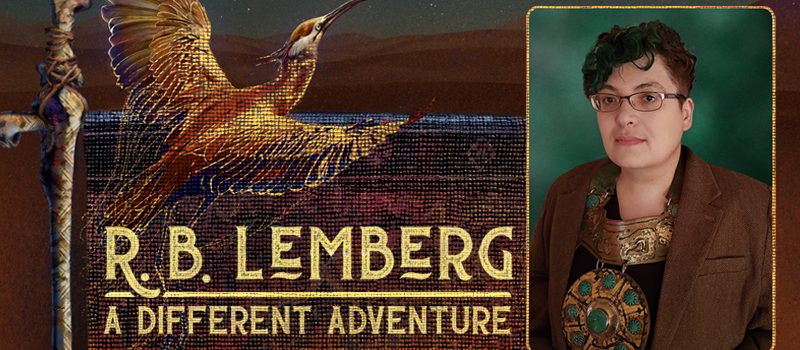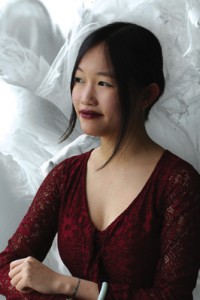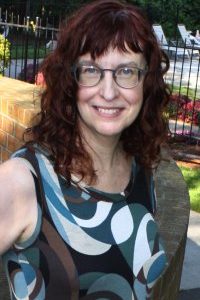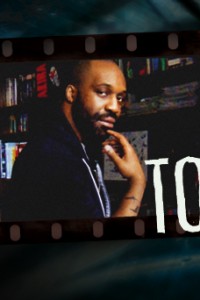R.B. Lemberg: A Different Adventure
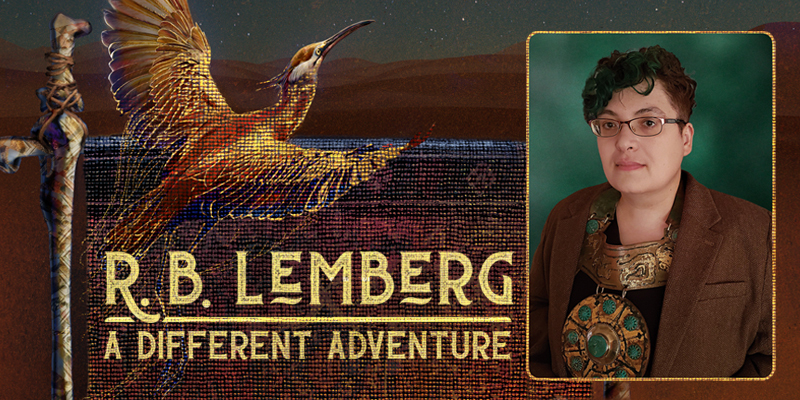
R.B. LEMBERG was born September 27, 1976 in Ukraine, and grew up there, in Russia, and in Israel. They attended graduate school at the University of California, Berkeley, where they studied Slavic linguistics, earning a PhD. They work as a sociolinguistics professor at a Midwestern university.
Lemberg began publishing poetry and fiction of genre interest in 2008, initially under the byline Rose Lemberg. Some of their poetry is collected in Marginalia to Stone Bird (2016).
Many of their poems and stories are set in the Birdverse, a sprawling secondary world with a deep history. Lemberg’s Birdverse novella The Four Profound Weaves (2020) was a finalist for the Nebula, Locus, and Ignyte awards, as well as an Otherwise Award honoree, and is a current World Fantasy Award nominee. Debut novel The Unbalancing is forthcoming.
Lemberg founded and co-edited Stone Telling magazine with Shweta Narayan from 2011 to 2016. Lemberg also edited The Moment of Change (2012) and An Alphabet of Embers: An Anthology of Unclassifiables (2016), and co-edited Climbing Lightly Through Forests: A Poetry Anthology Honoring Ursula K. Le Guin (2021, with Lisa M. Bradley).
Lemberg lives in Kansas with their spouse, author and editor Bogi Takács, and their child Mati.
Excerpt from the interview:
“The Four Profound Weaves is a novella that I wrote when I was finished working on the big manuscript of a novel. I always had this story, because in ‘Cloth’, there was the transgender grandfather who transitions. There was this woman who was around when he transitioned, and in fact she helped with that transition. She always tried to say something about the weaver Benesret, and the others would say, ‘No,’ and they would shush her. So I kept thinking about what was going on – what happened to Benesret? I had no idea what happened to Benesret. All of a sudden I saw it – again, it’s images, for me. I saw the tent with diamondflies flying out, the tent that they discover in the desert. And then I had this image of Benesret sitting in front of her tent and the palisade out of bones. It was a very vivid image. I had no idea before that Benesret had so many death attributes – but when I saw her, it was all death all the time. I knew that she wove this carpet of hope, her biggest work, the work of a very old woman who’s a master artist, but who feels completely unfulfilled in her creative agenda because her greatest work was woven very quickly. I mean, she worked on it for a while, but for her it was like, ‘Oh, I’m just doing it because I need to step through these weaves, and there are three weaves before the weave of death that I’m really trying to master, so I’m just going to go through the weaves, and now I’m doing the weave of hope.’ She produces this incredible carpet, and then the weave of death eludes her. She weaves from death, but it’s never a masterpiece, and she’s kind-of stuck. She’s living, and she’s feeding on others in a way, but she’s not progressing beyond that point in her craft. Then out of this image everything unraveled for me. I saw the journey. I hesitate to call it an adventure, but I hesitate not to call it an adventure. The MCs are older people who have lived very long, eventful lives, they have been through trauma. For me the trauma narrative is very important. I write about trauma, and I’m a trauma survivor – I’m very open about this. I write stories which are hopeful, I feel, but they do incorporate trauma elements more often than not. These elders are not going to have a lighthearted adventure the way somebody who is maybe 14 and without trauma would have, but they are also having a kind-of adventure. It’s a different type of adventure, the adventure you have after you’ve lived a long life. You have a lot of regret, and you’re wondering how much is left. You may have a lot of years left, but you just don’t know. From that vantage point, you’re making a journey. It’s really about discovery, but it’s not the same kind of self-discovery that the same characters would have experienced when they were teens.
“I’ve talked before about how nen-sasaïr comes from the Khana culture, who are inspired by my experiences as an immigrant to America, coming through parts of Jewish culture and parts of Jewish society, where LGBTQIA+ issues are complicated. I spent quite a few years as a part of Jewish Orthodoxy, and actually so has my partner Bogi Takács, in different branches. I was a part of Modern Orthodox communities, and Bogi was part of Chasidic communities – it’s more complicated for them, but it’s okay, they can give their own interview. Being out is what basically excluded me from continuing to be in these communities, although this is changing in America now. Even today, Jewish Orthodox communities are having a lot of very difficult conversations about transness and queerness. This has evolved in the last ten years, and it’s better now. It’s not where it needs to be maybe, but the discourses have evolved. So I was thinking about the situation from nen-sasaïr’s perspective, where he has spent his whole life living as a woman socially even though he wanted to come out in his twenties. But his communitywas not supportive, his lover was not supportive – there was always something. There was always some kind of societal pressure: ‘No, wait until this, wait until that, you can always do this later, I will tell you when the time is right.’ The time was never right until his partner passed away, and then he was like, ‘I’m done. I’m doing this.’ For him it was 40 years of wanting to transition, maybe even more. This is an experience that is not unique to a fantasy world. It is an experience of many people. Even people in liberal families can experience this kind of societal pressure – ‘Yes, but not you. Yes, but not now. Maybe wait a little bit. Maybe you will change your mind.’ That kind of discourse. I have experienced the full range of this. ‘Oh no, you cannot possibly be. But what about this? What about this person’s weak heart? The whole fabric of society will unravel if a person like you comes out.’
“One of my closest friends who is not from a white, middle class American background, hesitated for an extremely long time about coming out to their family, when they were out to pretty much everybody else, but the family piece was not there because of the risk involved – the risk of societal alienation. This has certainly been true for me. I have had a very difficult road with my family, and it does not have a happy ending. I do not want to say more. At this point I’m past it. But not every coming out results in an embrace from your family. Those are themes I wanted to explore. What happens if you come out when you’re 64? What happens if you’re finally where you need to be, and you’re 64, and you’re surrounded by people for whom it’s not a big deal? ‘Sure, no problem, you’re a man, we’ve always recognized you as a man, there’s never been any problem, why is it such a big deal for you?’ There’s this clash of cultures. When I was in the Bay Area I was still very closeted. When I was living in Berkeley, for most of the time, I was very closeted – I was part of the Orthodox Jewish community, and around me, even in the Orthodox community, I knew queer people. I knew a lot of queer people in Berkeley, and always had a lot of queer friends, and I always said, ‘Coming out is not for me. I know who I am and I’ve known always, but it’s not for the likes of me. I cannot. You don’t understand the culture I’m coming from. I will not have a family.’ All this was just a fact.
Interview design by Francesca Myman.
Read the full interview in the October 2021 issue of Locus.
 While you are here, please take a moment to support Locus with a one-time or recurring donation. We rely on reader donations to keep the magazine and site going, and would like to keep the site paywall free, but WE NEED YOUR FINANCIAL SUPPORT to continue quality coverage of the science fiction and fantasy field.
While you are here, please take a moment to support Locus with a one-time or recurring donation. We rely on reader donations to keep the magazine and site going, and would like to keep the site paywall free, but WE NEED YOUR FINANCIAL SUPPORT to continue quality coverage of the science fiction and fantasy field.
©Locus Magazine. Copyrighted material may not be republished without permission of LSFF.


